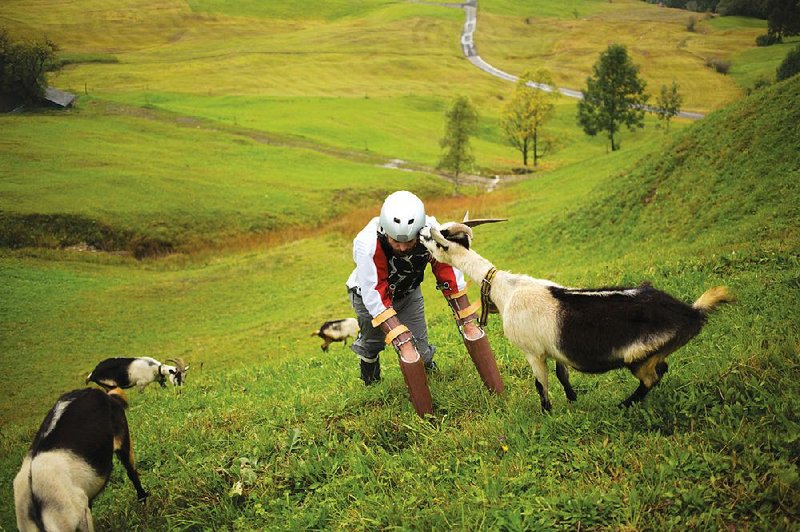We've all been in a funk, right? Disenchanted with work, uninspired by our surroundings, exhausted with the daily routine. That's what trips to the beach -- or career changes or moving or yoga retreats or ice cream -- are for.
When Thomas Thwaites. found himself a bored man, he decided to become a grazing goat instead.
A pseudo-goat, that is, and only for six days, but still closer than most of us will ever come -- or ever want to come. Funded by a big chunk of grant money, the British researcher suited up in a custom-made exoskeleton, ate grass and roamed on all fours with a herd in the Swiss Alps.
Thwaites describes the experience over more than 200 pages in a new book, GoatMan: How I Took a Holiday From Being Human. He answered a few questions about his life as a ruminant.
Q: Why did you decide to try living as a goat?
A: I was dog-sitting my nieces' dog while in this melancholic slump, and the dog was just oblivious. Totally fine, happy, in the moment, no worries. And I had that thought: "You're so lucky! I wish I could be you for a bit."
Q: Why a goat and not, say, a lion or a snail or a condor?
A: I actually started out by trying to become an elephant. But then I actually went to see some elephants, in the wild and in zoos, and found that they're such emotionally complex and intelligent animals. ... They are, I decided, almost too human. I went to visit a shaman [in Copenhagen], and she told me I should try and become a goat. I think she was quite right.
Q: Tell us about your goat suit.
A: I made the back legs and other pieces, but the front legs were made by Dr. Glyn Heath at a prosthetics clinic at the University of Salford, in England. He usually makes prosthetics for amputees and other people with body disabilities, but he agreed to make me some front legs because he'd started out as a zoologist. The front legs use the same materials and parts as used in prosthetic legs and are extremely robust, as I needed to use them in my attempt to cross the Alps as a goat. The back legs use parts from jumping stilts, as I was trying to make them springy enough so I could gallop along, completely free -- the dream! But impossible.
Q: Did you really eat only grass, and will you ever eat grass again?
A: I ate quite a lot of grass, from the pasture, but mammals don't produce the enzyme that digests the cellulose in grass. Goats and other ruminants have a rumen, which is filled with microorganisms (bacteria, fungi, etc.) that can break down grass. ... But the scientists I visited who actually use artificial rumens in their research strongly warned me that I shouldn't eat the product of an artificial rumen, in case I caught a long-term, incurable gut infection. So in the Alps, I had to use a pressure cooker at night to cook the grass I'd chewed up during the day, and spat into my not-quite artificial rumen. I was getting some energy/nutrition from the grass, but definitely not enough to survive on, so I had to resort to eating other food as well -- especially as the whole thing was physically far harder than I expected!
Q: How did the other goats treat you?
A: I think I made friends with a particular goat. We seemed to follow each other around as we grazed. There was a moment, though, where I looked up and saw I was in the middle of the herd, and everyone else had stopped chewing and was staring at me. It was like I'd inadvertently committed some sort of goat faux pas. Their horns suddenly looked pretty sharp. This was a scary moment, really. But then, a single goat, my goat friend I think, walked right through the center of the silent staring herd and sort of [eased] the tension, and we all moved off along the hill together. When I was leaving, the goatherd said that he thought that the herd had accepted me into their social group.
Q: Is life better as a goat or as a human?
A: Humans: Dissatisfied unless they've got the latest gizmo/admiration of their peers; have to worry about money, love, success, injustice, everything and nothing.
Goats: Satisfied as long as they've got some nice fresh green grass; only have to worry about trolls under bridges.
Style on 05/31/2016
